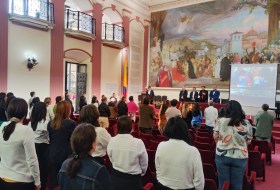News
The National Accreditation System is not a ranking, we promote a culture of continuous improvement. National Accreditation Council
University - Friday, December 16, 2022
José William Cornejo, from the National Accreditation Council in Colombia, raised a series of reflections during the event Contributions to the Management of Quality Culture, held by the University of Cauca to exalt the work carried out within the framework of its continuous improvement processes.
The dynamics of the Quality Management Center, since its foundation in 2015 and with the support of the team of Quality Managers and the willingness of the program committees for the self-assessment processes, integrates the Accreditation guidelines with the requirements of the ISO 9001:2015 certification. As a result, in this period, the University went from seven to twenty-eight accredited programs and twelve more are waiting for the CNA concept; In addition, 90 qualified registrations were renewed. Deibar René Hurtado Herrera, rector of the University of Cauca, stated during the event Contributions to the Management of Quality Culture, which was attended by Miguel Hugo Corchuelo Mora, Director of the Quality Management Center and the speakers, José William Cornejo from the National Accreditation Council and Óscar Mauricio Jerez from the University of Chile.
"This constitutes clear evidence of continuous improvement, recognized by the Ministry of National Education within good practices and relevant to the Institutional Accreditation Renewal process within the framework of our bicentennial," emphasized the Rector of the Alma Mater.
During the event that sought to exalt the work carried out within the framework of continuous improvement processes at the University of Cauca, José William Cornejo, a member of the National Accreditation Council in Colombia, stated that the first element to highlight is that high quality has several components, one of them is the capacities in front of the processes and another is the achievements, results and impacts.
“What I wanted to highlight is how the new accreditation guidelines in Colombia have emphasized, not only from the definition but from the entire development of the factors and characteristics. In particular, what has to do with graduates, research, projection and internationalization in the importance of the impacts that occur outside the university campus from the spatiotemporal point of view on social, productive, agricultural and industrial development. at a time when the country and Ibero-America are seeing a progressive de-industrialization with an emphasis on services and extractives. That is, in the primary and tertiary sector of the economy. The call is for a strong development of the secondary sector, taking advantage of the immense capacities that Colombian universities have in the development of new knowledge and new technologies.”
José William Cornejo added that the high quality of the institutions has to do with the three missionary functions: teaching, the integral formation of the students, who will be the future graduates and who will have influence at the national and regional level in the sector. productive and investigative, through the new knowledge and new technologies that must be incorporated in the productive, and in the social projection as a way of attending to the vulnerable populations of the country.
"So, high quality from the National Accreditation System is not a ranking, what we promote is that there is a culture of continuous improvement, a culture of self-assessment, a culture of quality that allows institutions and programs to go progressively improving according to what we have visualized from the CNA in Colombian institutions”, pointed out the member of the National Accreditation Council.
For his part, Óscar Jerez Yáñez, an academic from the University of Chile, referred to the importance of understanding that educational innovation is not change for the sake of change, but that it is an innovation that should have a positive impact on student learning. “This impact also has to be framed under the logic of the sustainable development goals, that is, we need to innovate in a transformation logic for the world thinking about how we impact training, society and institutional culture.” He concluded.
More Info:
Center for Quality Management and Institutional Accreditation
Email: acredigral@unicauca.edu.co


